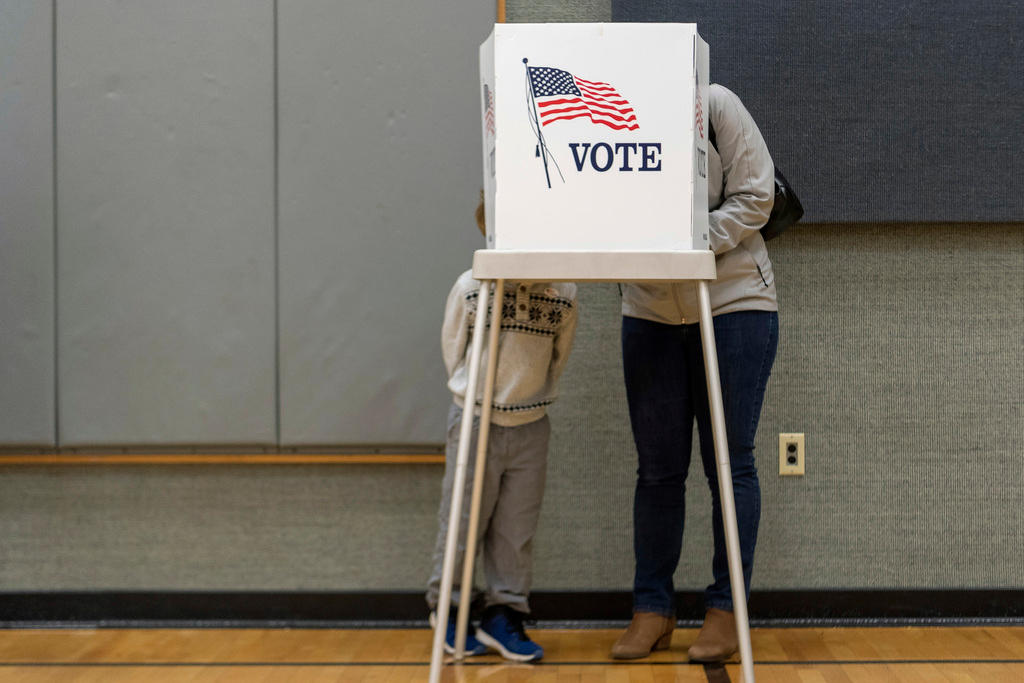A marathon, not a sprint: what the midterm elections mean for American democracy
Many people in Switzerland are deeply concerned about the state of American democracy. Why? Because what is happening in the US is not just about the 325 million people who live there. It is about values that the US and Switzerland hold in common: democratic norms, respect for the rule of law, freedom of the press, a commitment to human rights, peace, stability, environmental protection, and international cooperation, and basic norms of human decency.
And, for better or worse, the decisions of voters in the US have an enormous impact on people all over the world.
For example, Trump’s election radically altered our perception of what is “normal,” giving oxygen to racist, xenophobic, anti-Semitic, Islamaphobic and misogynistic words and deeds usually considered taboo in polite company and emboldening far-right populist movements and autocratic leaders around the world.
Almost one hundred years after Armistice Day, one has the strange feeling that we are hurling towards a repeat of the tragedies of the early and middle 20th century, except that a frightening number of us seem to have forgotten how these stories end.
So, what do yesterday’s midterm election results mean for people in the US and abroad? Is there cause for celebration? Yes – a muted, exhausted, close-the-door-and-weep sort of celebration, but a celebration nonetheless.
To be sure, the transformational moment in American politics that many had hoped for – the kind of euphoria experienced after Obama’s first election – did not come to pass. But nonetheless, America’s democracy – fragile, flawed, frustrating, and far from perfect – survived this leg of the race. And in a political environment poisoned with “alternative facts” and right-wing nationalism, that is something that we should not take for granted.

That said, the midterms election results also reinforce what we should have known all along, if we remember our US history. The roots of our racism, our fascination with violence, our preference for absolutist, black and white belief systems over the messy ambiguity of data-driven inquiry, run deep.
The race to build American democracy is not a sprint, but a marathon. And by all accounts, it will be a very long slog.
Here are the key takeaways, both encouraging and discouraging.
1. Historically high voter turnout
Voter turnout in this election was historically high in many states, particularly among young and first-time voters. Among Americans abroad, ballot requests were seven times higher than in 2014. This is extraordinary. Human behavior is notoriously sticky; we are creatures of habit. It is hard to build new habits, even when we know that they are good for us.
This increased turnout, coupled with an impressive increase of grass-roots activism, particularly among women, young people and minority communities, bodes well for our future. This is especially as today’s young people – an increasingly diverse population, committed to racial and environmental justice – take the reins of power.
2. Checks and balances
Democrats won the majority in the House of Representatives, though Republicans retain control of the Senate. Control of the House by the opposition party means that Congress can once again begin to exercise its constitutional duty to serve as a check on excessive use of Executive power. Whether by subpoena and investigatory powers, or by simply not agreeing to pass or fund Mr. Trump’s policy priorities (like the illusory border wall), the House can dampen some of the worst tendencies of the administration.

More
While US politics remains divisive, direct democracy is proudly at work locally
Trump will not be able to make good on many of his more outlandish campaign promises, which raises the possibility that his base will eventually tire and lose interest. Similarly, Republican Senators who want to see their policy priorities passed into law will have to tame their more radical impulses and compromise, as bills must pass both houses to become law.
Trump will likely continue to attempt to change policy – particularly in the field of immigration – by Executive Order, but these decisions will be litigated fiercely in federal court, where many judges are wary of Executive overreach and remain deeply principled, independent, and committed to the Constitution and rule of law. That said, the President will still have broad power in foreign relations. In addition, the President will continue to enjoy broad discretion in his appointments to the federal judiciary, as those appointments must only be approved by the Senate. Because federal judges enjoy lifetime tenure, this means that Trump’s more reactionary impulses can have long-term consequences.
Meanwhile, Democrats won (and lost) a number of key Governorships. This is significant because in many areas of policy, the most important decisions are made at the state and local levels, or power is shared by the federal and state governments. States like California and New York will continue to resist abuses of power by the Trump Administration and try to slow down his policy agenda, as in the field of environmental policy. In addition, state governments are responsible – within guidelines set by Congress and the Constitution – for legislative redistricting following the census. Most state legislatures are currently controlled by Republicans, but Democrats picked up a few legislatures this election. More balance of power in state governments reduces the likelihood of gerrymandering and other unfair election processes employed in recent by Republicans of late.
3. More women, especially Native American, Black, Latina, and Muslim women, in government
Mr. Trump is well known for his unapologetic use of misogyny, xenophobia, Islamaphobia and racism for political gain. I think we are wrong to underestimate just how effective this strategy is at dividing, or just how skilled a propagandist Mr. Trump is, especially given the bully pulpit – now in its literal sense – of the Presidency. That said, people in a democracy will only accept being attacked and belittled for so long. For the first time in US history, there will be more than 100 women in the House of Representatives, many of whom are mothers and/or military veterans – both excellent preparation for a career in public service.
Women also won several Governorships. Furthermore, despite gerrymandering, voter suppression efforts, and long historical legacies of racism and xenophobia, women of color made astonishing and historic gains. For the first time in its history, the House will include Native American and Muslim women, including Ilhan Omar, a former refugee from Somalia. Many states are represented in Congress for the first time by an African-American or Latina woman. Stacey Abrams might still become the Governor of Georgia, which would be historic in many respects. The significance of this sea change cannot be understated. As our federal, state and local governments begin to reflect more and more the true diversity of America, there is hope that we will finally put an end to public policies that deny equal opportunity to people and communities of color.
4. Racism and xenophobia
To the extent that the election was a referendum on the President’s political strategy of using racism and xenophobia to divide America, the results are, unfortunately, mixed. On the one hand, given the strength of the economy, the President’s party lost a very high number of seats in the House and a large number of Governorships.
On the other hand, Republican gains in the Senate and the win of some key Governor’s races also indicate that the President’s dangerous strategy of appealing to the worst parts of our nature remains seductive – at least in certain parts of the country. Given the US’s legacy of genocide, slavery, segregation and xenophobia, our flirtation with these old evils is not entirely surprising. But it means that we need to renew once again our commitment to coming to terms with our past and with this ugly and shameful aspect of our culture.
5. Cracks in the foundation
Finally, this election further exposed serious cracks in the foundation of our democracy, from gerrymandering and the outdated electoral college system (which has not been updated to reflect the increasing population gap between urban and rural states), to active voter suppression and disenfranchisement efforts.
The majority of Americans still disapprove of President Trump and the Republicans, but the distribution of voters among rural and urban areas strongly favors Republicans, as shown by the results of the Senate races. However, a minority party that tends to the extreme can only continue to govern effectively for so long. These election results will continue to put pressure on lawmakers to reform these rules. (One bright spot is that a ballot initiative in Florida to restore voting rights to people with felony convictions passed). Finally, this election further exposed problems with the role of money in politics.
So where does this all leave us? If protecting American democracy is a marathon, not a sprint, then I am afraid we are at Mile 20. The runner’s high is gone, and we’ve hit the wall. Many of us feel like we simply cannot go on, that maybe it would be better to give up. But we cannot – we have too much to lose. So, let us take a break, rest our legs, and fuel up. And tomorrow, let us start running again.
Alexandra Dufresne is an American human rights lawyer. She teaches American law in Switzerland, works with refugee rights NGOs, and is the Co-Founder of Action Together: Zurich, CH.

In compliance with the JTI standards
More: SWI swissinfo.ch certified by the Journalism Trust Initiative












You can find an overview of ongoing debates with our journalists here . Please join us!
If you want to start a conversation about a topic raised in this article or want to report factual errors, email us at english@swissinfo.ch.